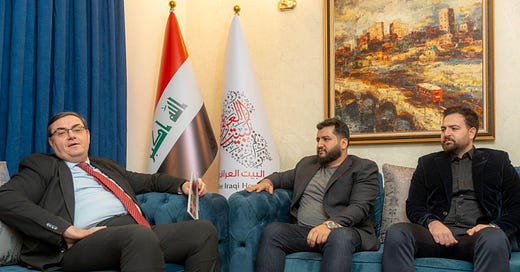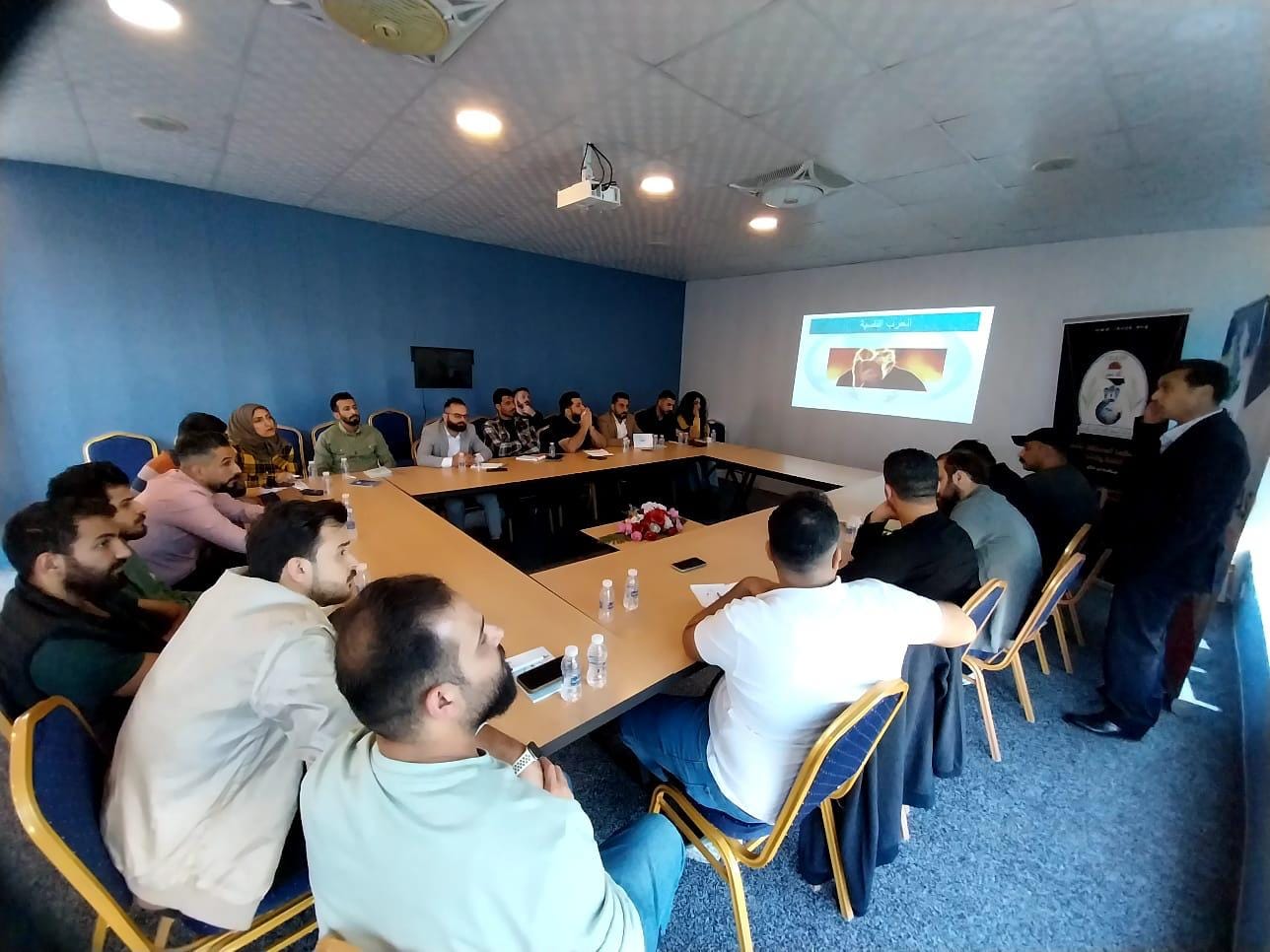Under Siege but Unbowed
The Iraqi Home Movement fights for a free and democratic Iraq with IBB’s support
BAGHDAD, Iraq — Threats of assassination, arrest warrants, and constant intimidation are the realities Muhi Al Ansari faces daily. Yet, despite these dangers, he remains resolute that Democracy is worth it. “There are more than five warrants against me, multiple death threats against my team, and constant attempts to silence us,” Muhi shared with a somber, determined voice. But he is undeterred, working tirelessly in Baghdad for a vision of a democratic Iraq.
Muhi is a leading figure in the Iraqi Home Movement, a young political coalition striving to bring political reform to a country where power and resources are monopolized by entrenched political elites, many with strong ties to neighboring Iran. For Muhi, the threats are real and ongoing, but they are not enough to break him. “I stay because I believe we are making a difference. Even if the change is small, it is paving the road for others who share our vision.”
In Iraq's deeply polarized political landscape, the odds are heavily stacked against pro-democracy movements. The ruling political class, backed by immense financial resources and military power, maintains a tight grip on the country’s political system. “The big parties own not just the government but also the economy. It’s not a democratic system,” Muhi explains. “The only democratic aspect left is the ability to go to elections.”
The entrenched political elites have weaponized outdated laws from the 1960s and 70s, remnants of Iraq's authoritarian past, to stifle dissent and maintain their power. “The political system does not always align with the constitution. They use outdated laws to restrict our freedoms and cripple our efforts,” Muhi elaborates. Despite these constraints, Muhi and his team are committed to challenging the status quo. Their weapon? The very constitution that is often manipulated by the ruling class.
Muhi and the Iraqi Home Movement are leveraging Iraq's post-2003 constitution, which guarantees freedoms and political participation, as their primary tool for reform. “Our struggle is to use those constitutional rights to break the monopoly of power,” Muhi says. In a political landscape where power is concentrated in the hands of a few, the Iraqi constitution remains a vital tool for those seeking democratic change.
The movement operates strategically, using legal advocacy, policy papers, and lobbying to push for constitutional reforms. They have already scored significant victories, including amending a law that threatened civil society organizations and successfully protecting journalists from prosecution outside legal contexts. “It was a legal victory, but we still need legislation to solidify it,” Muhi admits, aware of the challenges that lie ahead.
For Muhi, the risks are personal and profound. He has faced multiple assassination attempts, arrest warrants, and continuous threats to his life and those of his team members. The ruling political parties, threatened by the group’s growing influence, have even orchestrated his and other teammate’s termination from jobs—both in the public and private sectors. Yet, he continues his work, motivated by the progress they have achieved.
“In my opinion, we did make an impact already in a lot of matters that we had to literally fight for with the existing policies. We pushed back many misconceptions that existed within the three state powers in Iraq—the executive, legislative, and judicial authorities,” Muhi explains. “Even if our impact was little, it still allows us and people like us in our partner institutions or even our friends to make a small change.”
Muhi says his team is his family. “We support each other and stick together to overcome all the personal and non-personal obstacles and difficulties,” he says. This unity, he believes, is their greatest strength and a source of strength amid constant pressure. Even the group’s opposition respects their unity and determination.
This cohesive team structure has not only earned them respect but has also helped them navigate Iraq’s complex political terrain. “We believe that peaceful change is the best option for us Iraqis and for the world in general,” Muhi states, emphasizing their commitment to non-violence and democratic principles.
Underpinning the coalition’s strategic approach is the support and training provided by Ideas Beyond Borders (IBB). In a political landscape rife with challenges, IBB empowers political leaders and party members with the knowledge and skills they need to navigate Iraq’s complex electoral system.
The Iraqi Home Movement and other emerging political groups face an electoral system designed to favor established parties with financial and political clout. “The Electoral experience in Iraq still needs to be improved,” Muhi explains. “We learned how to campaign strategically, how to operate within the electoral laws, and how to compete against powerful parties that rely on financial and political resources we don’t have.”
IBB’s specialized training programs focus on developing expertise in electoral laws, strategic planning, and communication. By equipping participants with the tools to collaborate effectively across civic and liberal parties, IBB is fostering a new generation of leaders who are capable of challenging the status quo.
To counter the restrictions imposed by outdated laws and political manipulation, Muhi and the team have built alliances with like-minded political groups and civil society organizations. They engage directly with government authorities, present policy papers, and lobby for legal reforms.
They have also formed two influential networks:
A coalition of emerging political parties with shared democratic values.
A network of civil society organizations that communicate directly with relevant authorities, engaging in dialogue and presenting proposals for legal and policy changes.
This strategic coalition-building has enabled the movement to push for democratic reforms while protecting civil rights. “We are building things up brick by brick,” Muhi explains. Their long-term vision focuses on gradual, incremental change, using the Iraqi constitution as their foundation.
One of the movement’s significant achievements has been advocating for the rights of journalists. In Iraq, journalists have long been targets of arbitrary detention and violence. The team lobbied for legal reforms that now protect journalists from prosecution outside legal frameworks and ensure their right to legal representation.
They also organized protests against legislative and executive violations, launched media pressure campaigns, and worked closely with the Human Rights Commission linked to the Ministry of Justice to document human rights abuses in detention centers and prisons.
Muhi’s commitment is rooted in a profound love for his country. “Even if the change is small, it matters. It shows others that it is possible to fight against injustice, that it is possible to make a difference,” he says. Muhi believes that the future of Iraq lies in the hands of those who dare to dream of a better tomorrow.
The coalition is daring to imagine a different future—a future where democracy is more than just a word, but a reality for all Iraqis. So the fight continues. And so does the hope for a free and democratic Iraq.
This article was written by Reid Newton.






